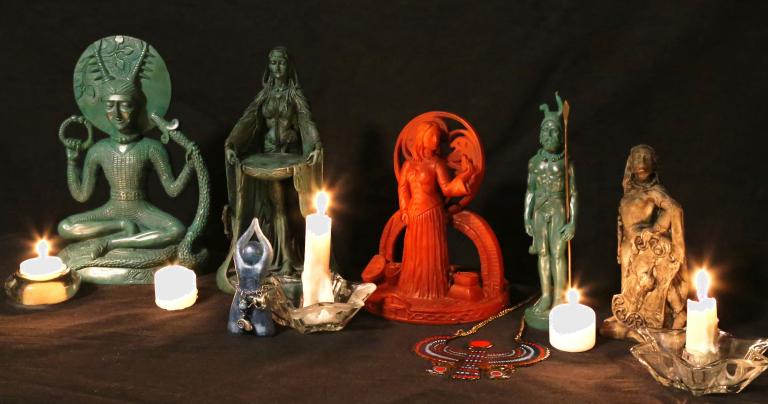Once again I’m seeing people talking about how a certain God is angry with them for paying attention to other deities. Or how they’ve been told They want an exclusive relationship, and hinted that Bad Things will happen if They don’t get it.
This is almost always an inaccurate reading of the situation. I wrote about this a couple years ago, but while that post is still good, I want to explore the “why” in more depth. It’s not just that our Gods are not jealous Gods. Why we think they’re jealous is a symptom of an even larger problem.
The Gods want what They want
None of the Gods I know or know of are shy about asking for what They want. Except that “ask” is often too mild a word. “Demand” or “insist on” is usually a better way to describe it. Whether They want your prayers and offerings, your service in support of Their virtues and values, or simply you, if They want it They’ll let you know.
You may be able to say no. You may be able to negotiate more favorable terms. Or you may have no choice in the matter at all. Regardless of the details, a deity asking for something significant is quite common among Pagans and polytheists.
Few contemporary polytheists experience a demand for exclusivity
But rarely do these requests include “worship only Me.”
Our Gods are not jealous Gods. They want what they want, but once They get it They rarely care Who else you work with or for.
And why would They? They don’t claim to be the only God, or the only God worthy of worship. They don’t have fragile egos that need constant reinforcement.
Some people are told “I want you to concentrate on My work for now.” Or “your altar is full enough – you can’t handle Anyone else.” But these are practical concerns, not demands for a henotheistic relationship rooted in divine jealousy.
Your experiences are valid – your interpretations may not be accurate
Our experiences of the Gods are deeply personal and highly subjective. Rarely do multiple people have the same experience at the same time. You know what you heard, saw, and felt… and no one else does. How can I – or anyone else – tell you you’re wrong?
Our experiences are always real. But the experience is the raw data. We filter it through our human senses and analyze it with our human brains, in the context of our prior knowledge and experiences. Only then can we interpret it and decide what it means.
This is the process of discernment. If our context is insufficiently broad or deep, we’re likely to make errors in interpretation – like a small child who sees a camel for the first time and calls it a “sand horse.” That’s kinda cute and it’s a reasonable guess, but it’s wrong: a camel isn’t a horse. If you’re a small child at the zoo, that may not matter. If you’re about to set off on a long journey across the desert – or if you’re trying to compete in the Kentucky Derby – it matters a great deal.

The impact of foundational assumptions
Foundational assumptions are our core ideas about the world and the way it works. They’re what we think is possible, and what we won’t even consider because we’re sure it’s not possible.
Many of our ideas about the Gods are things we believe because we’ve always assumed they were true, or because we’ve always been told they were true. We’ve never examined them carefully to determine – as best we can – if they actually are true.
Christianity dominates our mainstream culture and it has for over a thousand years. Christian thinking is everywhere, especially for those of us who grew up in Christian churches. Many new Pagans’ ideas about “the Goddess” strongly resemble “Yahweh in a dress.” Their ideas about the Many Gods are taken straight from the attributes of the Christian God.
Yahweh makes it clear that He is a jealous God. So be it. Cernunnos, the Morrigan, Brighid, and the vast majority of deities known to humanity make no such demands.
So why do some people insist that their call to devoted service is really a call to exclusive service? Because they’ve always been told that “God” is a jealous God, and they unreflectively (and usually unconsciously) assume all Gods must also be jealous Gods.
This is why Pagan theology is important
I understand that many Pagans have little interest in deep and complicated thinking about the Gods. Some people just want to work magic, care for the Earth, and dance the Maypole at Beltane. That’s fine – not everybody is meant to be a priest or a mystic or even a devout lay person.
I also understand that contemporary Pagan and polytheist theology is very much in its infancy. And what we do have is quite diverse. It’s not like we can hand a new person a catechism and expect that to tell them all they need to know.
But what we have here is the equivalent of selecting a camel when you really need a horse because isn’t a camel just a sand horse? And besides, you can’t tell me what to do.
Our Gods are not jealous Gods. People are assuming the Morrigan will be angry with them for singing hymns to the Dagda, when it’s highly likely She’ll appreciate those hymns too. They’re assuming a short term intensive is intended to be forever, and universal to all of Her followers.
Spend some time reading Pagan and polytheist theology. I’ve got some here. Read Ascendant – I reviewed Volume 1 and I have a piece in Volume 2. Read other authors and bloggers.
And then think about what you read. If you come to the conclusion that you’re being called into a henotheistic relationship, great. That does happen, at least occasionally.
Just make sure you come to that conclusion after an honest period of discernment and not because you’re unconsciously falling back on ideas from a religion you don’t practice anymore… or maybe that you never did.
















